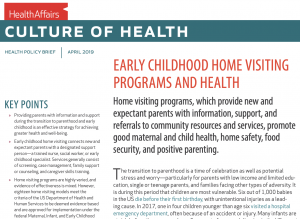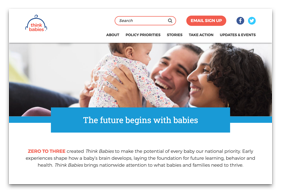
Prevention and early intervention services through regular affordable professional support leads to better outcomes for young children and their families.
For Our Babies recommends policies and practices that support home visiting, developmental screenings, special needs services, and services for families in crisis.
Home visiting
The Crisis
Inconsistent strategies across the US leaves many babies and families without the support they need. As of September 2017, only 20 home visiting models in the US met federal criteria to be considered evidence based, and few were available to homes of all newborns1. Home visiting programs do operate in all 50 states, the District of Columbia, and 5 U.S. territories, but each with their own goals. States decide on how they want to allocate their home visiting funds, which usually are a mix of federal, state, and local funds. Some states only focus on healthy births; some only serve first-time parents or families at risk of child abuse or neglect; and still others offer home visiting to all parents of newborns.
Why It Matters
Multiple studies in different communities show that evidence-based home visiting programs can improve a variety of social and educational outcomes for children and families. Children involved in home visiting are better prepared for school and experience fewer emergency room visits and less abuse and neglect2.
We Recommend
Affordable visits to the homes of all newborns for the first two years that include guidance by professionals trained in parenting and healthy development, along with counseling on early emotional, social, intellectual, linguistic, and perceptual and motor development
In the Library
Featured resources about home visiting See all
Developmental screenings
The Crisis
In 2018, 4.3 million children in the United States were without health care coverage, and many more were underinsured — meaning many children do not have regular health care providers who would screen during regular well-baby visits and make referrals as needed3. Children with developmental disabilities who are not identified until they are in public school systems may have experienced significant delays and missed opportunities for treatment4.
Why It Matters
Early identification of special needs means the possibility of early intervention. Significant brain development occurs in the first three years of life, so the earlier the intervention the better with significant cost savings.
We Recommend
Affordable developmental screenings to identify physical and behavioral needs, with referral to affordable help when needed
In the Library
Featured resources about developmental screenings See all
Special needs services
The Crisis
Many families struggle to find affordable, high-quality, consistent, developmentally appropriate child care for their children that addresses their child’s unique and special needs. Even when services are available, families may not be equipped to navigate them or effectively advocate for their children.
Why It Matters
Early intervention services have a moderate and positive effect on the developmental progress of many disabled children, especially those younger than three years of age.
We Recommend
Affordable services for children with identified special needs
In the Library
Featured resources about special needs services See all
Services for families in crisis
The Crisis
Within the broad framework of free intervention services, there is a wide variation across the nation in the kind of interventions, duration of services, size of caseloads, and components of service characterizes these programs.
Why It Matters
When families are in crisis, they cannot wait for services. Brain research confirms constant stress alters the formation of neural pathways, so that coping and thinking mechanisms don’t develop as they should. Any delay in services could have a grave impact on a child’s ability to cope later in life5.
We Recommend
Free intervention services for families in crisis
In the Library
Featured resources about services for families in crisis See all
What you can do
Think Babies
ZERO TO THREE created Think Babies to make the potential of every baby our national priority and focuses on five key policy areas: paid leave, child care, Early Head Start, home visiting, and infant and early childhood mental health. The website has links for many ways to take action on each of the policy areas.
- National Conference of State Legislatures: https://www.ncsl.org/research/human-services/home-visiting-improving-children-s-and-families-well-being.aspx https://www.ncsl.org/Portals/1/Documents/cyf/Early-Childhood-Home-Visiting_v04_web.pdf
- National Conference of State Legislatures: https://www.ncsl.org/research/human-services/home-visiting-improving-children-s-and-families-well-being.aspx
https://www.ncsl.org/research/human-services/early-childhood-home-visiting-what-legislators-need-to-know.aspx#Key%20Issues - Berchick, E. R., & Mykyta, L. (2019). Children’s public health insurance coverage lower than in 2017. U.S. Census Bureau. https://www.census.gov/library/stories/2019/09/uninsured-rate-for-children-in-2018.html
- Centers for Disease Control and Prevention. (2020). Development monitoring and screening. https://www.cdc.gov/ncbddd/childdevelopment/screening.html
- Center on the Developing Child. (n.d.). Toxic stress derails healthy development. https://developingchild.harvard.edu/resources/toxic-stress-derails-healthy-development/








